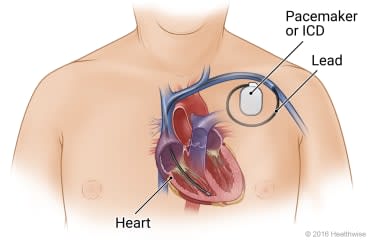
What is it?
Pacemakers and implantable cardioverter-defibrillators (ICDs) are battery-powered devices that are implanted in the body to treat heart rhythm problems. Your device is placed beneath the skin of your chest. One to three wires (called leads) connect the device to your heart. When the battery runs down, or if the device isn't working well, you may choose to have the device replaced.
The leads can be left in place and reconnected to your new device. But if your doctor thinks you need new leads, the doctor can replace them at the same time.
You will get medicine before the procedure. This helps you relax and helps prevent pain. You may also get an antibiotic to help prevent infection. The doctor will make a cut in the skin next to your device. The doctor will remove the device and put a new one in its place. The doctor will then attach the leads to the device. The cut will be closed with stitches, tape, or a special glue.
The procedure usually takes about an hour. You may go home the same day. If the leads were replaced, you may need to spend the night in the hospital.
How do you prepare for surgery?
Surgery can be stressful. This information will help you understand what you can expect. And it will help you safely prepare for surgery.
 Preparing for surgery
Preparing for surgery
- Be sure you have someone to take you home. Anesthesia and pain medicine will make it unsafe for you to drive or get home on your own.
- Understand exactly what surgery is planned, along with the risks, benefits, and other options.
- Tell your doctor ALL the medicines, vitamins, supplements, and herbal remedies you take. Some may increase the risk of problems during your surgery. Your doctor will tell you if you should stop taking any of them before the surgery and how soon to do it.
- If you take a medicine that prevents blood clots, your doctor may tell you to stop taking it before your surgery. Or your doctor may tell you to keep taking it. (These medicines include aspirin and other blood thinners.) Make sure that you understand exactly what your doctor wants you to do.
- Make sure your doctor and the hospital have a copy of your advance directive. If you don't have one, you may want to prepare one. It lets others know your health care wishes. It's a good thing to have before any type of surgery or procedure.
What happens on the day of surgery?
- Follow the instructions exactly about when to stop eating and drinking. If you don't, your surgery may be canceled. If your doctor told you to take your medicines on the day of surgery, take them with only a sip of water.
- Follow your doctor's instructions about when to bathe or shower before your surgery. Do not apply lotions, perfumes, deodorants, or nail polish.
- Do not shave the surgical site yourself.
- Take off all jewelry and piercings. And take out contact lenses, if you wear them.
 At the hospital or surgery center
At the hospital or surgery center
- Bring a picture ID.
- The area for surgery is often marked to make sure there are no errors.
- You will be kept comfortable and safe by your anesthesia provider. You may get medicine that relaxes you or puts you in a light sleep. The area being worked on will be numb.
- The surgery may take about 1 hour. It may take longer if the leads are replaced.
Current as of: July 31, 2024
Author: Ignite Healthwise, LLC Staff
Clinical Review Board
All Ignite Healthwise, LLC education is reviewed by a team that includes physicians, nurses, advanced practitioners, registered dieticians, and other healthcare professionals.

